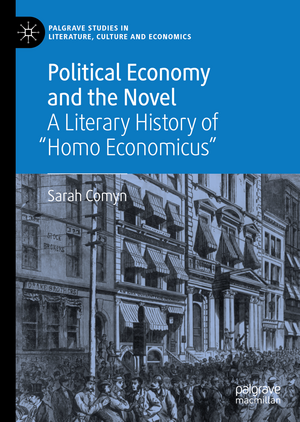Political Economy and the Novel: A Literary History of "Homo Economicus": Palgrave Studies in Literature, Culture and Economics
Autor Sarah Comynen Limba Engleză Hardback – 24 oct 2018
| Toate formatele și edițiile | Preț | Express |
|---|---|---|
| Paperback (1) | 638.11 lei 6-8 săpt. | |
| Springer International Publishing – 22 dec 2018 | 638.11 lei 6-8 săpt. | |
| Hardback (1) | 643.48 lei 6-8 săpt. | |
| Springer International Publishing – 24 oct 2018 | 643.48 lei 6-8 săpt. |
Preț: 643.48 lei
Preț vechi: 757.04 lei
-15% Nou
Puncte Express: 965
Preț estimativ în valută:
123.13€ • 128.88$ • 102.48£
123.13€ • 128.88$ • 102.48£
Carte tipărită la comandă
Livrare economică 31 martie-14 aprilie
Preluare comenzi: 021 569.72.76
Specificații
ISBN-13: 9783319943244
ISBN-10: 3319943243
Pagini: 301
Ilustrații: XII, 283 p.
Dimensiuni: 148 x 210 x 22 mm
Greutate: 0.5 kg
Ediția:1st ed. 2018
Editura: Springer International Publishing
Colecția Palgrave Macmillan
Seria Palgrave Studies in Literature, Culture and Economics
Locul publicării:Cham, Switzerland
ISBN-10: 3319943243
Pagini: 301
Ilustrații: XII, 283 p.
Dimensiuni: 148 x 210 x 22 mm
Greutate: 0.5 kg
Ediția:1st ed. 2018
Editura: Springer International Publishing
Colecția Palgrave Macmillan
Seria Palgrave Studies in Literature, Culture and Economics
Locul publicării:Cham, Switzerland
Cuprins
1. Introduction.- 2. Chapter Two: The Contested Birth of Homo Economicus.- 3. Chapter Three: The Speculative World of Sandition.- 4. Chapter Four: A Marginal Life.- 5. Chapter Five: The Compulsion to Consume.- 6. Chapter Six: The Neoliberal Ideologue.- 7. Chapter Seven: The Asymmetric Prostate.- 8. Coda.
Notă biografică
Sarah Comyn is Postdoctoral Fellow on the ERC-funded project SouthHem at University College Dublin, Ireland.
Textul de pe ultima copertă
Political Economy and the Novel: A Literary History of ‘Homo Economicus’ provides a transhistorical account of homo economicus (economic man), demonstrating this figure’s significance to economic theory and the Anglo-American novel over a 250-year period. Beginning with Adam Smith’s seminal texts – Theory of Moral Sentiments and The Wealth of Nations – and Henry Fielding’s A History of Tom Jones, this book combines the methodologies of new historicism and new economic criticism to investigate the evolution of the homo economicus model as it traverses through Ricardian economics and Jane Austen’s Sanditon; J. S. Mill and Charles Dickens’ engagement with mid-Victorian dualities; Keynesianism and Mrs Dalloway’s exploration of post-war consumer impulses; the a/moralistic discourses of Friedrich von Hayek, and Ayn Rand’s Atlas Shrugged; and finally the virtual crises of the twenty-first century financial market and Don DeLillo’s Cosmopolis. Through its sustained comparative analysis of literary and economic discourses, this book transforms our understanding of the genre of the novel and offers critical new understandings of literary value, cultural capital and the moral foundations of political economy.
Caracteristici
Examines the history of the novel and the role economics has played Contributes to new economic criticism Examines canonical novels from Jane Austen, Charles Dickens, Ayn Rand, and Don DeLillo










